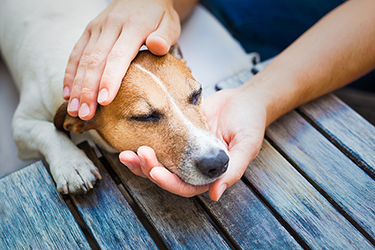Poisonous Items to Keep Away from Pets

Help your clients keep their homes safe for their pets
It is not uncommon for a pet owner to come home and find that their pet has gotten into something. Even more common is when that “something” was completely unexpected. Most pet owners know to keep chemicals, medications and even chocolate away from their pets, but there are other toxic items about which most pet owners may not even be aware.
The third week of March is national Poison Prevention Week. Take this opportunity to share with your clients some things to keep away from their pets. Here is a list of just a few household items:
- Garbage disposal cleaner. Cats love to play with these. Lemon scented deodorizers/cleaners are shaped like a toy and contain citrus oil (d-limonene), which is toxic to cats.
- Medications, vitamins and supplements. These often come in flavored, gummy form and taste like candy, making them irresistible to dogs.
- Laundry detergent. Laundry detergents generally come in three forms: powder, liquid and pods. The pods are popular because they make detergent distribution convenient and simple. However, they also look like treats to a pet and can cause pneumonia and aspiration when ingested.
- Mothballs. Traditional mothballs contain Napthalene, which can cause lethargy, seizures, difficulty breathing and anemia in dogs.
- Sugar-free items. Most sugar-free items contain an artificial sugar substitute. Read the labels and be wary of xylitol, a sugar-free substance that and cause low blood sugar and liver damage in dogs.
As the spring season approaches, consider the outdoor threats
As the weather gets warmer, clients will be spending more time outside with their pets. With that spring weather comes blooming foliage, which can be poisonous to animals. Remind your clients to be aware of their surroundings and watch out for certain plants. Here are a few:
-
Tulips and hyacinths are known to cause allergic reactions. If chewed or ingested, they can cause irritations to the mouth and esophagus.
-
Daffodils contain lycorine, which can trigger vomiting.
-
Certain lilies (Peace, Peruvian and Calla) can cause minor irritation, while others (Tiger, Day, Asiatic, Easter and Japanese Show) can even be deadly.
-
Crocus plants are common in the spring and can cause vomiting and diarrhea if ingested.
-
Lily of the Valley causes symptoms of digitalis if ingested.
It is also important to look out for fertilizers, pesticides and insecticides. Most are not very toxic, but make your client aware of ingredients like blood meal, which can cause intestinal problems and sometimes is fortified with iron. Click here for photographs of these poisonous plants as well as a detailed description of harmful fertilizer ingredients.
What to do after contact with a poisonous substance?
For most of your clients, pets are members of the family. Discovering that a pet is sick from poisoning can make an owner feel frightened and powerless. Here are a few basic instructions you can provide to your clients to make them feel more prepared:
- Remove your pet from the area of danger.
- Check your pet for any signs of unusual behavior or breathing patterns.
- Do not give your pet home antidotes.
- Consult your veterinarian before attempting to induce vomiting.
Make sure your clients know your policy for emergencies, and advise them to keep your phone number in a convenient place.
Easy changes to keep the home safer for pets.
Here are a few alternatives to potentially toxic, everyday household items that you can recommend for your clients:
- Pain relievers. Most over-the-counter pain relievers now come in multiple forms. Liquid gel and rapid-release forms dissolve at a much faster rate than tablets. Either way, you will need to take immediate action if you pet ingested human medication, but tablets will allow you more time.
- Laundry detergent. Try to avoid the pod form of laundry detergent and stick with the traditional powder or liquid form.
- Mothballs. Read the ingredients. There is another variety available containing Paradichlorobenzene (PDB), which is also toxic but has significantly milder side effects.
- Garbage disposal cleaner. Choose the orange or lavender scented varieties. They are far less toxic to cats than the lemon.
- Vitamins and supplements. Opt for the tablet form without flavor.
- Chocolate. This is the hardest change to make, but the rule is simple, the lighter the chocolate, the safer it is. Dark chocolate is the most dangerous for dogs.
- 5-HTP. Like vitamins and supplements, there are popular over-the-counter sleep medications that come in gummy form. It is always best to stick to tablet form.
The Pet Poison Helpline offers 24/7 animal poison control help and emergency instructions. You can find their list of the Top 10 Most Frequently Reported Poison Dangers for Dogs here.
The ASPCA offers printable lists of toxic and non-toxic plants for dogs, cats and horses.
Global Animal offers great tips for detecting potential poisoning in a dog.
Contact your Covetrus representative for more information at 855.724.3461 or online.
Sources
http://www.humanesociety.org/animals/resources/tips/common_household_dangers_pets.html
http://www.petpoisonhelpline.com/blog/eat-must-not-easy-household-swaps-less-toxic-products/
https://www.aspca.org/pet-care/animal-poison-control/toxic-and-non-toxic-plants
http://www.petpoisonhelpline.com/pet-owners/seasons/spring/
https://www.globalanimal.org/2013/10/25/how-to-know-if-your-dog-has-been-poisoned/
Need Regulatory Assistance
If you need help with regulatory or licensing issues, we're happy to help. We have a wide variety of resources to help you when issues arise.

Careers
Are you looking for a place to let your talents shine? At Covetrus, we help our practitioner customers better serve their patients and take pride in providing the best customer experience possible. Search our open positions to see our available opportunities.
Newsletter
Stay current with what’s going on with Covetrus, subscribe to receive our newsletter and email communications. Subscribers will receive the latest information in practice management, sales and marketing, animal health, and more.


Leave a comment